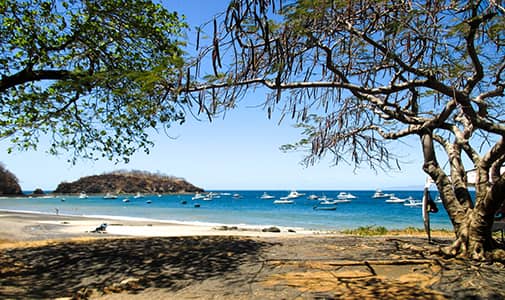David D. Says:
I retire this year with a Social Security check of $3,600 a month. I’ve never been to Costa Rica, but many of my friends have. I’d like to retire there too but I don’t know where to start.
I want to rent an apartment or condo on the Pacific coast, near the beach. Any advice you have would be appreciated.
IL Latin America Correspondent Jason Holland Says:
 Hi David,
Hi David,
Since you’ve never been to Costa Rica before, my first piece of advice would be to visit for a few weeks or a month to scout it out and find a location you like. This way, you can discover first-hand whether an area offers the type of social life, lifestyle, climate, and activities you’re looking for.
There are many places on the Pacific coast that may attract you, such as the surf town of Tamarindo, seaside resort city Jacó, or the grittier waterfront town of Quepos.
I recommend you pick up a copy of our Costa Rica Scouting Trip Itineraries and Travel Guide. This incredibly helpful, timesaving resource contains three highly-researched Costa Rica travel itineraries you can follow to find your ideal community.
Once you find a community you like, spend time there during the change of seasons to get an idea of what the climate will be like all year round. (Remember, the rainy season lasts from May to November with certain areas experiencing daily rainfall for weeks at a time.)
Although it may be tempting to stay at an all-inclusive resort or big beachfront hotel during your scouting trip, it should be avoided. It’s fun to sip on tropical drinks by the pool. But you won’t be getting an authentic experience. And you’ll be sealed off from the “real world.”
You have three better options that will help you get to know the community you’re interested in living in and experience daily life first-hand. First, you could find a vacation rental home or condo. By living in a neighborhood, you’ll interact with other residents, shop for groceries, test your Spanish, eat in local restaurants… You’ll get a taste of what it’s really like to live there. Sites like VRBO are ideal for finding high-quality rentals.
Renting a room in a home is another way to go. Not only will you live in a real neighborhood, but you’ll also be in someone else’s home, whether it’s a local or expat. Your “landlords” will be great resources and contacts as you explore your surroundings. Check out Airbnb.
Finally, you can find accommodation at a B&B or guest house. The owners will be a source of information about the local area and can offer tips and advice on a personal level about living in a certain area. They’ll also have plenty of contacts, whether you decide to look for real estate or want to contact expats in the area.
Once you’ve found the neighborhood you want to call home, it’s time to look for a long-term rental.
Talk with expats and locals you meet and ask them if they know of places for rent—they know the best deals and properties not listed online or in the newspaper. Most major cities have well-known expat meeting places where you can ask around. There are also a number of Facebook groups for each city or region. This is a great place to find listings.
The classifieds section of online local newspapers is also a good source for rentals (especially to get a feel for prices).
Once you’ve identified potential rentals, go for a look. Walk through the property, check out the neighborhood and, if possible, talk with some neighbors.
Then, if you’re satisfied, talk price. It will help if, through your initial research, you know what the going prices are. Never be afraid to negotiate; often you can get the monthly payment reduced or a benefit like weekly maid service thrown in.
You may be asked to sign a contract or lease. Before you do, have the document translated if you don’t speak Spanish. It’s a good idea to have an attorney (independent from the landlord’s attorney) look it over on your behalf. Understand your rights and obligations and voice any concerns. (Make sure you know who is responsible for paying utilities, phone, internet, and cable TV bills—usually that burden falls to the renter.)
I’d recommend you order our Escape to Costa Rica guidebook, which goes into this process in more detail. It also contains vital information about visas and residency, cost of living, and every other detail you may need to know.
Got a Question?
Send your thoughts to mailbag@internationalliving.com. We’ll post and respond to as many of your emails as we can right here in the e-letter.

